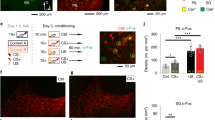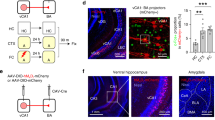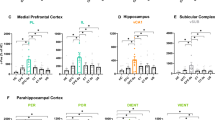Abstract
Pavlovian fear conditioning depends not so much on the contiguity (temporal overlap) of the conditioned stimulus (CS) and unconditioned stimulus (US) as on contingency, the ability of the CS to predict US occurrence1. Associative long-term potentiation (LTP)2, a cellular model of associative learning3,4, occurs in the lateral nucleus of the amygdala (LA)5, the putative locus of plasticity in fear conditioning6. Here we show that associative LTP in LA, like fear conditioning, is sensitive to stimulus contingency.
This is a preview of subscription content, access via your institution
Access options
Subscribe to this journal
Receive 12 print issues and online access
$209.00 per year
only $17.42 per issue
Buy this article
- Purchase on Springer Link
- Instant access to full article PDF
Prices may be subject to local taxes which are calculated during checkout


Similar content being viewed by others
References
Rescorla, R. A. J. Comp. Physiol. Psychol. 66, 1–5 (1968).
Bliss, T. V. & Lomo, T. J. Physiol. (Lond.) 232, 331–356 (1973).
Levy, W. B. & Steward, O. Brain Res. 175, 233–245 (1979).
Kelso, S. R., Ganong, A. H. & Brown, T. H. Proc. Natl. Acad. Sci. USA 83, 5326–5330 (1986).
Weisskopf, M. G., Bauer, E. P. & LeDoux, J. E. J. Neurosci. 19, 10512–10519 (1999).
LeDoux, J. E. Annu. Rev. Neurosci. 23, 155–184 (2000).
Markram, H., Lubke, J., Frotscher, M. & Sakmann, B. Science 275, 213–215 (1997).
Magee, J. C. & Johnston, D. Science 275, 209–213 (1997).
Guo-qiang, B. & Poo, M.-M. Annu. Rev. Neurosci. 24, 139–166 (2001).
Rogan, M. T., Staubli, U. V. & LeDoux, J. E. Nature 390, 604–607 (1997).
Huang, Y. Y., Martin, K. C. & Kandel, E. R. J. Neurosci. 20, 6317–6325 (2000).
Huang, Y. Y., Colina, A., Selig, D. K. & Malenka, R. C. Science 255, 730–733 (1992).
Bear, M. F. & Malenka, R. C. Curr. Opin. Neurobiol. 4, 389–399 (1994).
Nakamura, T., Barbara, J. G., Nakamura, K. & Ross, W. N. Neuron 24, 727–737 (1999).
Martin, S. J., Grimwood, P. D. & Morris, R. G. M. Annu. Rev. Neurosci. 23, 649–711 (2000).
Acknowledgements
This research was supported in part by the NIMH grants RO1 MH 46516, KO2 MH00956, R37 MH 39774 and MH 11902-01A1 to J.E.L, and by a grant from the W.M. Keck Foundation to N.Y.U.
Author information
Authors and Affiliations
Corresponding author
Rights and permissions
About this article
Cite this article
Bauer, E., LeDoux, J. & Nader, K. Fear conditioning and LTP in the lateral amygdala are sensitive to the same stimulus contingencies. Nat Neurosci 4, 687–688 (2001). https://doi.org/10.1038/89465
Received:
Accepted:
Issue Date:
DOI: https://doi.org/10.1038/89465
This article is cited by
-
Evaluation of ambiguous associations in the amygdala by learning the structure of the environment
Nature Neuroscience (2016)
-
Inhibition of learning and memory by general anesthetics
Canadian Journal of Anesthesia/Journal canadien d'anesthésie (2011)



